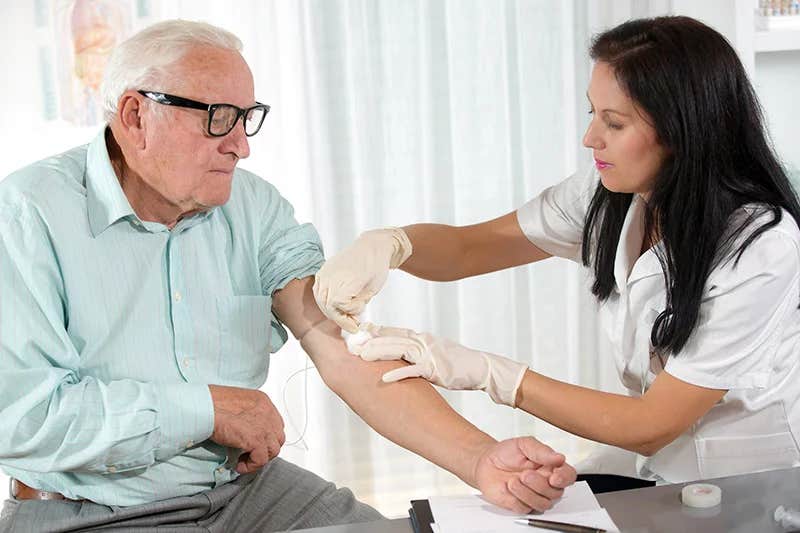Mayo Clinic’s simple blood test revolutionizes Alzheimer’s diagnosis
Groundbreaking blood test accurately diagnoses Alzheimer’s, providing a less invasive, cost-effective alternative to traditional methods.

A simple blood test offers accurate Alzheimer’s diagnosis, promising widespread clinical adoption and early treatment access. (CREDIT: Getty Images)
Early and accurate diagnosis of Alzheimer's disease remains crucial, especially with recent breakthroughs in treatments for its earliest stages. Current tests for Alzheimer’s involve brain scans known as PET scans and spinal taps to measure proteins indicating brain changes. While accurate, these tests can be invasive, uncomfortable, and costly. Scientists now offer a promising alternative—a simple blood test that reliably identifies Alzheimer's with accuracy comparable to more invasive methods.
Researchers at Mayo Clinic recently demonstrated the effectiveness of blood tests to diagnose Alzheimer’s in a clinical outpatient setting. The team published their findings in Alzheimer's and Dementia: The Journal of the Alzheimer's Association, highlighting a 95% sensitivity rate—meaning it accurately detected Alzheimer's 95% of the time—and an 82% specificity rate, effectively ruling out the disease in those without it.
Blood Tests: A Practical Alternative
Alzheimer’s disease, characterized by progressive memory loss, behavioral changes, and cognitive decline, deeply affects patients and their families. Its early detection can significantly improve patient care and expand treatment options. Standard diagnostic tests, such as PET imaging and cerebrospinal fluid analysis, accurately detect Alzheimer's but come with high costs and patient discomfort.
Recognizing the limitations of current diagnostics, Mayo Clinic neurologist and dementia specialist Dr. Gregg Day emphasized the need for accessible, non-invasive alternatives.
“Our study found that blood testing affirmed the diagnosis of Alzheimer’s disease with 95% sensitivity and 82% specificity,” Dr. Day explains. “When performed in an outpatient clinical setting, this is similar to cerebrospinal fluid biomarkers and far more convenient and affordable.”
Comprehensive Clinical Validation
To ensure reliability in real-world settings, Mayo Clinic scientists assessed over 500 patients at an outpatient Memory Disorder Clinic in Florida. These patients experienced a wide variety of cognitive impairments, including typical memory-related symptoms of Alzheimer's, Lewy body dementia, vascular impairment, and other atypical cognitive disorders.
Related Stories
Patients in the study were aged between 32 and 89, with symptoms beginning around age 66 on average. Over half were ultimately diagnosed with Alzheimer’s disease. This diverse patient group mirrors typical clinic populations, validating the broad clinical use of blood tests.
Researchers focused on measuring two critical blood proteins—Aβ42/40 and p-tau217—which indicate the buildup of amyloid plaques, a hallmark of Alzheimer's. Results confirmed significantly higher levels of p-tau217 in patients diagnosed with Alzheimer’s, demonstrating clear differentiation from other cognitive conditions.
Biomarkers Influenced by Kidney Function
Importantly, the study found plasma p-tau217 concentrations were affected by kidney function. Elevated biomarker levels correlated with impaired kidney function, a critical insight that clinicians must consider to interpret results correctly. This finding underscores the complexity of blood-based diagnostics and the importance of holistic patient evaluation.
Of the patients tested, blood biomarkers positively identified Alzheimer's in 267 individuals. Specifically, 233 out of 246 patients with Alzheimer’s-related cognitive impairment (95%) had positive biomarker profiles, reinforcing the accuracy of blood-based diagnostics.
Expanding Utility and Access
Blood tests hold tremendous promise beyond diagnostic clarity. Researchers emphasize their potential for selecting suitable participants for clinical trials and assessing patient response to new treatments. With recent approvals of treatments like lecanemab and donanemab targeting early-stage Alzheimer’s, accessible and affordable diagnostics have become even more critical.
The Mayo Clinic study aligns with prior research demonstrating blood test effectiveness compared to traditional amyloid PET scans. Dr. Day's team plans to extend research to broader and more diverse populations, including those who are asymptomatic but at risk for Alzheimer’s.
Future studies will also explore how disease-specific factors, such as other medical conditions, influence biomarker accuracy. Continuous validation will help integrate blood tests into regular clinical practice, enhancing the speed and ease of Alzheimer’s diagnoses worldwide.
Dr. Day stresses this research’s importance in moving toward widespread implementation. “Reliable blood-based diagnostics will profoundly impact how quickly and effectively we diagnose Alzheimer's, bringing meaningful changes to patient care and treatment strategies,” he says.
Ongoing Research and Innovation
The next phase of this research will assess the use of blood tests in even more diverse patient groups and younger individuals at risk for Alzheimer's but not yet symptomatic. These studies could help identify Alzheimer's at its earliest possible stage, potentially years before symptoms appear, revolutionizing prevention and treatment efforts.
This promising development was highlighted at the recent American Academy of Neurology Annual Meeting, attracting global attention from researchers and clinicians. The findings represent an exciting step toward making Alzheimer’s diagnosis more accessible and less stressful for millions of patients and families worldwide.
With continued refinement, these blood tests may soon become the standard in outpatient clinics everywhere, transforming how doctors approach Alzheimer's diagnosis and care.
Note: The article above provided above by The Brighter Side of News.
Like these kind of feel good stories? Get The Brighter Side of News' newsletter.



